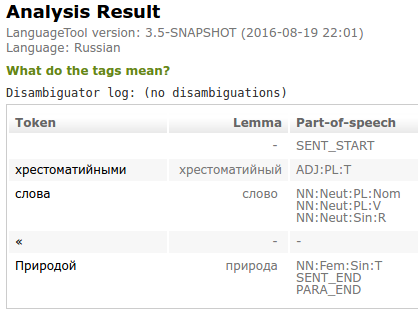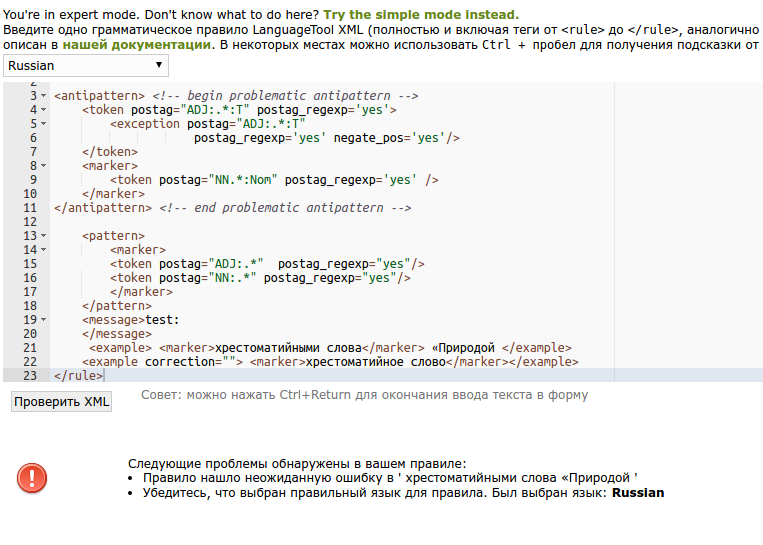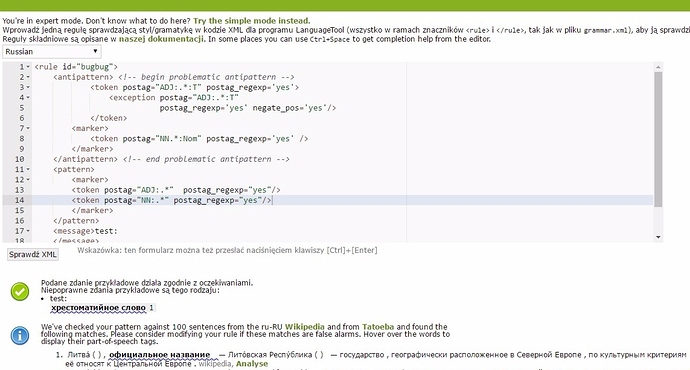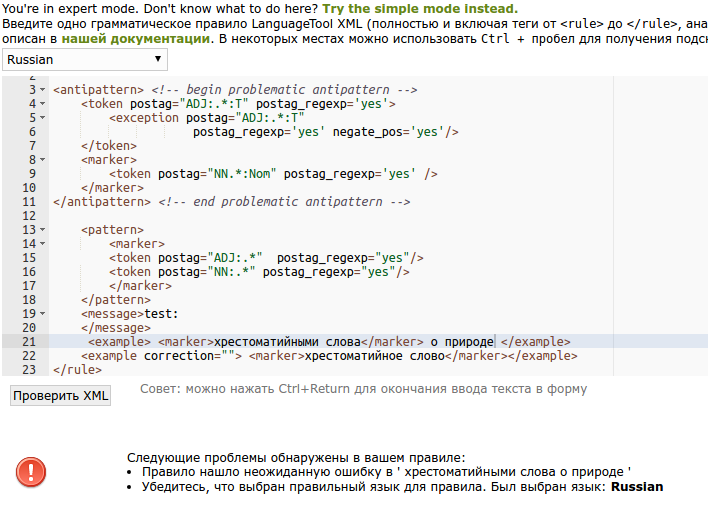Hi,
I need help with using antipattern feature. To test it I have created the rule, so it detects marker and I hope it is correct.
<rule id="test" name="test">
<pattern>
<token postag="ADJ:.*:T" postag_regexp='yes'>
<exception postag="ADJ:.*:T"
postag_regexp='yes' negate_pos='yes'/>
</token>
<token postag="(NN|NNN):.*:Nom" postag_regexp='yes' />
</pattern>
<message>Test</message>
<example correction="">Ставшие <marker>хрестоматийными слова</marker> «Природой здесь нам суждено в Европу прорубить окно», которые А. С. Пушкин вкладывает в уста Петра I — лишь риторически эффектная фраза.</example>
</rule>
The next step was to copie the token set to the antipattern of the real rule languagetool/grammar.xml at master · languagetool-org/languagetool · GitHub
However, it doesn`t work as expected. The same example (with removed correction and marker block) is commented out here languagetool/grammar.xml at master · languagetool-org/languagetool · GitHub
If I try to uncomment it I will get an error from ./testrules.sh ru
Running XML pattern tests...
Known languages: [English, English (US), English (GB), English (Australian), English (Canadian), English (New Zealand), English (South African), Persian, French, German, German (Germany), German (Austria), German (Swiss), Simple German, Polish, Catalan, Catalan (Valencian), Italian, Breton, Dutch, Portuguese, Portuguese (Portugal), Portuguese (Brazil), Russian, Asturian, Belarusian, Chinese, Danish, Esperanto, Galician, Greek, Icelandic, Japanese, Khmer, Lithuanian, Malayalam, Romanian, Slovak, Slovenian, Spanish, Swedish, Tamil, Tagalog, Ukrainian, Testlanguage]
Running XML validation for ru/ru-RU/grammar.xml...
No rule file found at /org/languagetool/rules/ru/ru-RU/grammar.xml in classpath
Running pattern rule tests for Russian... Exception in thread "main" java.lang.AssertionError: Russian: Did not expect error in:
Ставшие хрестоматийными слова «Природой здесь нам суждено в Европу прорубить окно», которые А. С. Пушкин вкладывает в уста Петра I — лишь риторически эффектная фраза.
Matching Rule: Unify_Adj_NN_case[3]
at org.junit.Assert.fail(Assert.java:88)
at org.junit.Assert.assertTrue(Assert.java:41)
at org.junit.Assert.assertFalse(Assert.java:64)
at org.languagetool.rules.patterns.PatternRuleTest.testCorrectSentences(PatternRuleTest.java:472)
at org.languagetool.rules.patterns.PatternRuleTest.testGrammarRulesFromXML(PatternRuleTest.java:272)
at org.languagetool.rules.patterns.PatternRuleTest.runTestForLanguage(PatternRuleTest.java:198)
at org.languagetool.rules.patterns.PatternRuleTest.runGrammarRulesFromXmlTestIgnoringLanguages(PatternRuleTest.java:149)
at org.languagetool.rules.patterns.PatternRuleTest.main(PatternRuleTest.java:558)
Running disambiguator rule tests...
Running disambiguation tests for Russian...
25 rules tested (47ms)
Tests successful.
Running XML bitext pattern tests...
Running tests for Russian...
Tests successful.
Validating false-friends.xml...
Validation successfully finished.
Any ideas how to fix it? Or may be other proposals to add this two token exception to the role?
Best regards,
Konstantin Ladutenko



 It makes me crazy…
It makes me crazy…